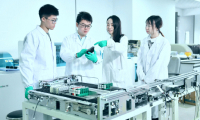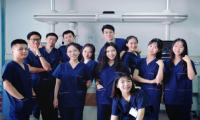Enrollment is open for the International PhD Programs in Biology and Biomedical Engineering, Shenzhen University Medical School
Applications are now being accepted for the Shenzhen University (SZU) Medical School international PhD programs in biology and biomedical engineering.
Program Overview:
Biology
Led by Professors Wei-Guo Zhu, Shunichi Takeda and Xingzhi Xu, this cross-disciplinary program enables students to gain critical scientific thinking skills, theoretical knowledge, and professional experience in biological techniques used in the research laboratory setting.
During the program, students will undertake independent laboratory-based research on exciting and relevant research questions, ensuring they remain at the frontiers of the biomedical sciences. Potential mentors include Dr. Wei-Guo Zhu (epigenetic regulation and DNA damage response), Dr. Shunichi Takeda (homologous recombination repair and radiation biology), Dr. Xingzhi Xu (DNA replication and DNA damage repair), Dr. Baohua Liu (genome instability and ageing), Dr. Huiqiang Lou (DNA replication), Dr. Xinchun Chen (tuberculosis research) and Dr. Yongxian Cheng (isolation and chemical biology of natural products. More information on the potential mentors is available at: http://med.szu.edu.cn/Category_556/Index.aspx.
Biomedical Engineering (Medicine/Engineering/Sciences)
The program aims at training students with solid theoretical and systematic professional knowledge in advanced biomedical electronics, artificial intelligence in biomedicine, intelligent sensors, molecular medicine and related biomedical engineering fields. Graduates of this program will have the abilities to undertake independent scientific research, understand the current status and future trends of medicine/biomedical engineering, and write and communicate in English.
MAIN RESEARCH FIELDS:
1. Biomedical instrumentations and informatics: Study, research on and apply advanced biomedical instrumentation, informatics and artificial intelligence techniques to collect, analyze and evaluate health-related biomedical information. Establish mechanical, electrical, analytical, statistical and machine learning techniques, hardware and/or software, for the driving clinical/biomedical needs.
2. Cell and tissue engineering: research on various types of stem cells and bio-scaffold materials technology, research on tissue engineering and regeneration technology for acute and chronic injury and disease; research on cell engineering and nanomaterial labeling technology based on modern gene technology, to achieve the in vivo and in vitro cell tracing and monitoring, and develop new sources of stem cells; research on industrialization amplification technologies for stem cells, including the development of 3D culture and amplification systems and bioreactor systems.
3. Systematic Biomedical: Using techniques and methods of biophysics and biochemistry, bioinformatics and systems biology for understanding human aging and major diseases such as tumor, cardiovascular and cerebrovascular disease, metabolic disease, infectious disease; using cells, tissues, organs to the overall system to carry out original research at multiple levels, explore human disease mechanisms, develop translational medicine, and provide personalized and precise diagnosis and treatment programs.
4. Biosensor and Bioanalysis: Targeting the key issues of cancer diagnosis and cancer therapy evaluation by developing novel strategies in biomolecular detection and synthesizing functional nanomaterials for can cell imaging and therapy: 1) Developing highly selective, sensitive, or multiplex electrochemical and optical methods for in-vitro biomolecular analysis. 2) Fabricating multi-functional nanoprobes for cell recognition, imaging, and intracellular biomolecular regulation. 3) Designing multifunctional nanomaterials-based theranostic platforms for cancer diagnosis and cancer therapy.
Shenzhen is an international city of innovation in China: It is located across the bay from Hong Kong and offers a subtropical monsoon climate with clean air all year round. SZU (https://en.szu.edu.cn/) is the only comprehensive university fully supported by the Shenzhen municipal government. The School of Medicine hosts an internationally competitive faculty focusing on DNA damage repair, cancer, infectious disease, cardiovascular disease, and drug discovery.
Successful PhD candidates will receive a generous scholarship to cover all research costs, tuition fees, and work-related travel, as well as a stipend not less than 6,000 RMB per month. Successful candidates are also eligible to apply for a Guangdong Government Outstanding International Student Scholarship, which is awarded to outstanding foreign students.
Eligibility
A maximum of 20 successful PhD candidates will be enrolled on the programs in February 2024, with the expectation that they will be awarded their PhD degree within 4-6 years. To be eligible to apply to the programs, applicants must:
Ø Be foreign citizens of the People’s Republic of China, demonstrated by a valid foreign passport.
Ø Be fluent in written and spoken English, evidenced by a TOEFL (at least 95) or IELTS (at least 6.5) score report if not a native of an English-speaking country.
Ø Hold a Bachelor's (for Biology program only) or Master’s degree in a biological sciences discipline with a GPA in the top 40% of class from a top 300 QS ranking university, or with a GPA in the top 25% of class from a 301-700 QS ranking university. The QS World University Rankings can be found here: https://www.topuniversities.com/university-rankings/world-university-rankings/2023. Any SCI publications is a plus.
Application Procedure
To apply for a position on the programs, potential candidates must provide:
Ø A completed, signed and scanned application form that is available from http://med.szu.edu.cn/Item/1208.aspx or by email request from stakeda@szu.edu.cn (for biology program), lishuangshuang@szu.edu.cn (for biomedical engineering program) and molmed.hsc@szu.edu.cn.
Ø A detailed CV demonstrating competence and motivation for science.
Ø A personal statement of approximately 2,000 words, which details an area of study of interest (in the form of a brief research plan) and supervisor, and outlines study or professional work experience, academic and/or research achievements, and future career goals.
Ø Two letters of recommendation from professors or associate professors (or persons of equivalent positions), emailed by the referees directly to stakeda@szu.edu.cn (for biology program), lishuangshuang@szu.edu.cn (for biomedical engineering program) and molmed.hsc@szu.edu.cn.
Ø A copy of all degree transcripts and certificates. Note that all documents must be translated into English and certified. Hard copies will be requested ONLY after acceptance of a place on the programs.
Ø A synopsis of the diploma thesis.
Ø A copy of the official TOEFL or IELTS score report.
Ø A copy of a valid ordinary passport used for private affairs.
Ø A high resolution, electronic ID photo that resembles the passport photo.
All application materials must be in English language and emailed to stakeda@szu.edu.cn (for biology program), lishuangshuang@szu.edu.cn (for biomedical engineering program) and molmed.hsc@szu.edu.cn by November 15th, 2023. Any applications lacking any of the above will not be considered. Please note that application materials will not be returned.
Short-listed candidates will be notified and offered a time and date for a virtual interview with the recruitment panel by the late of November.








用户登录
还没有账号?
立即注册